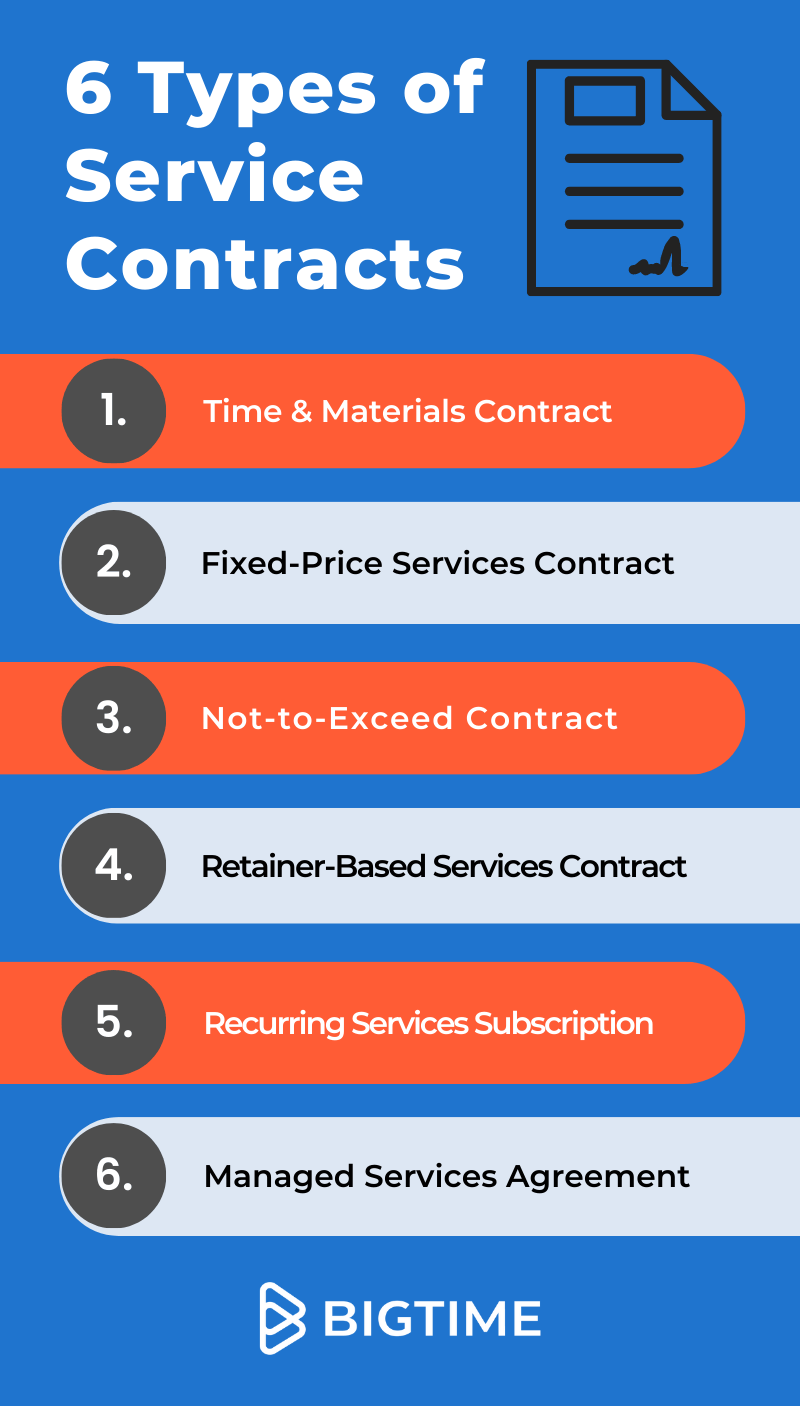

Recommended for you Everything You Need to Know: Fixed Price Contracts and Revenue Recognition for Professional Services READ


A professional services contract agreement is defined as a contract structure between a professional services firm or consultant and the client that dictates the expectations of each party. It dictates who bears risk, when money changes hands, and how the final project-based service is to be delivered.
In this post, we will look at three of the most common professional services contracts, and present examples where each type will perform well. We will then dive into three additional professional service contract examples that incorporate additional components to shift risk, reduce variability, and up-sell existing work.
Regardless of which contract structure works best for your professional services organization (PSO), make sure your professional services software fully supports the time tracking, forecasting, budgeting, invoicing, and revenue management in an efficient and scalable manner.
One of the most common contract types for professional services engagements, time and materials (T&M), enables a firm to bill their clients for the amount of work that they perform. Under this contract structure, time is tracked for each individual performing work and is then billed at a pre-negotiated hourly or daily rate. Individuals will also track any expenses incurred as part of the project and pass them on to the client for reimbursement.
Although time and materials engagements are one of the simplest types of professional services contracts, the most successful firms will use robust project accounting software to track their progress.
Fixed price contract structures are an increasingly popular contract structure for delivering professional services. This is especially true in an economic environment where clients have the power to push some additional risk on to their vendors. According to SPI Research’s latest Professional Services Benchmark, nearly 39% of projects are delivered on a fixed price basis. When utilizing this model, a client agrees to pay a fixed price for a (hopefully) well-defined deliverable.
These contract structures shift the risk onto the service provider, as they have agreed to deliver the project regardless of how much effort it may take. For professional services firms that know how to manage a fixed price project efficiently, the additional risk of a fixed price project will deliver a significant reward.
If a time and materials contract and a fixed price contract got together and had a child, it would be a not to exceed (NTE) contract. These contract structures, which are also called time and materials with a cap, are designed to reduce the amount of risk carried by the client even further than a fixed price contract.
Using this model, a firm will deliver work on a time and materials basis up to a certain point. Once that point is reached, the professional service firm is no longer able to bill for additional work, but is still required to complete the deliverables of the contract.
These contract structures tend to be the worst of all possible worlds for a PSO in that revenue generated on the project cannot exceed the negotiated cap if the labor investment proves to be more than the initial estimate as there would have been in a T&M contract. However, if the labor investment proves to be less than the initial estimate, there is no upside of being able to bill the client the full contract value as there would have been with a fixed price contract.
As such, PSOs tend to use NTE agreements only when they absolutely have to, when deliverables are well understood and predictable, and when it’s likely that they’ll be able to negotiate change orders or cap increases with clients in good faith.

Not just for lawyers anymore, retainers are making their way into all sorts of professional services agreements and consulting agreements. In a professional services context, retainers are often used when there is uncertainty around when work will be performed and quick turnaround times are needed. The terms of retainer-based contracts can vary widely, but the basic premise is the client will pay a set amount up front for delivery of services during a set service period.
If the PSO works less than what the retainer covers, then the PSO will keep the balance. If the PSO works more than what the retainer covers, then the PSO will invoice for any overages on a time and materials basis.
Subscription-based services are quickly becoming a core offering in a professional services firm’s arsenal. Depending on the types of services a PSO is offering, using a subscription model can be powerful. Under this type of approach, clients will pay an ongoing monthly fee for recurring deliverables. Those deliverables could include access to a proprietary software solution, detailed monthly reporting and analysis, or smaller deliverables that accrue overtime.
As of late, there has been quite a bit of conversation surrounding the productization of services. The recurring service subscription model is perfect for services that have been successfully productized.
Managed services agreements are also becoming a common tool that traditional professional services firms and consulting firms deploy. Historically, managed service providers (MSPs) sold managed services agreements, which focused on providing a specific level of services for an extended period of time. Common examples would include outsourced IT services, equipment maintenance, and outsourced business functions such as payroll.
Under a managed services agreement, the service provider will make specific guarantees around their availability, response time, resolution scope, and overall responsibilities. The client will likely pay a fixed rate in return for these guarantees.
In the traditional professional services context, managed service agreements are becoming popular as an add-on to custom software development work. Instead of charging clients to fix problems as they arise on a time and materials basis (which can be costly and unpredictable), follow-on support services are being sold as a packaged offering.
Choosing a professional services contract structure for delivering a project is a delicate balance. Quite often the contract structure selected will depend on client relationships, experience with the services, and the professional service software used to manage the business. Regardless of which professional services contract structure or type of consulting contract you select, managing the project to that contract is essential. The most successful professional services firms will utilize their professional services automation (PSA) solution for this purpose.
PSA software helps PSOs to install tight controls around the planning, tracking, and invoicing of work. This is especially important for professional services contracts that shift risk away from the client. Having a clear picture of progress, mid-project profitability, and budget health gives the project management team the tools the need to ensure professional services contracts deliver their expected returns.
Here’s a post on professional services contracts, revenue recognition and ASC 606 compliance.
Or, watch our webinar on extending the life of your accounting system to understand how Projector by BigTime’s project accounting subledger capabilities works for the entire delivery organization.
And if you’re ready to learn more about how BigTime Software can support your professional services contract types, schedule a PSA demo t oday.
.png) professional services contracts" />
professional services contracts" />
A professional services contract is defined as a contract structure between a professional services firm or consultant and the client that dictates the expectations of each party. It dictates who bears risk, when money changes hands, and how the final project-based service is to be delivered.
Common types of professional services contracts for consulting services include:
1. Time and materials contract
2. Fixed price services contract
3. Not to exceed (or time and materials with a cap) contract
4. Retainer-based services contract
5. Recurring service subscription
6. Managed services agreement
Quite often the type of consulting service contract will depend on client relationships, experience with the services, understanding the strengths and weaknesses of each type as it relates to your specific business, and the professional service software used to manage the business.
Professional services contracts and consulting services agreements can greatly vary depending on the types of projects and services needed, but some core elements include:
1. Scope of Work – Details the expected services to be performed and the deliverables the customer can expect to receive.
2. Timeline – Clearly notes which services are to be completed when.
3. Compensation – Includes how compensation will be charged and handled, as well as when money changes hands.
4. Agreement Duration and Clauses – Outlines how long the agreement is valid for and applicable termination clauses.

Recommended for you Everything You Need to Know: Fixed Price Contracts and Revenue Recognition for Professional Services READ